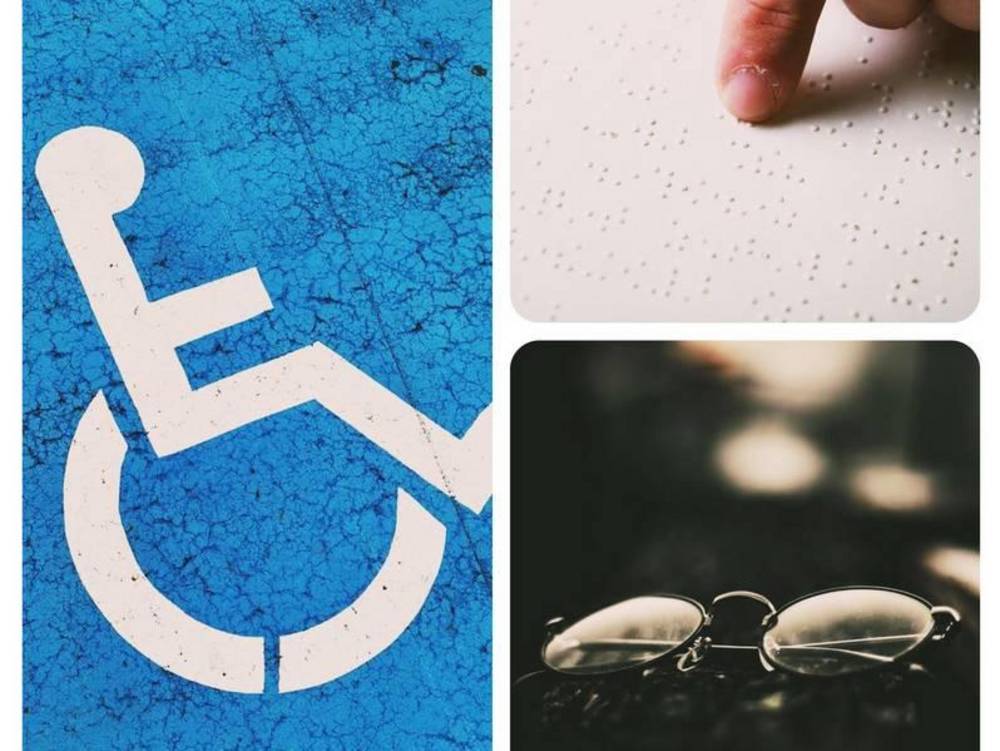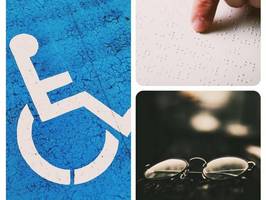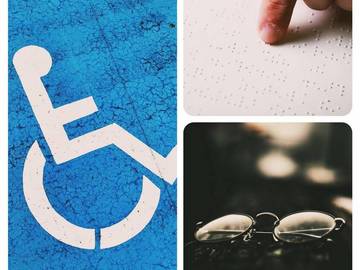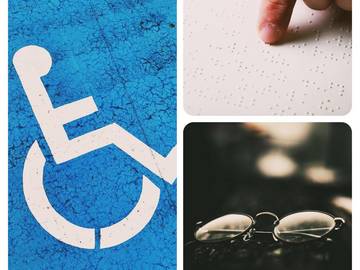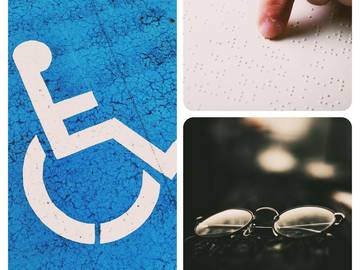Between October and December 2022, the Human Rights Ombudsman of the Republic of Slovenia (the Ombudsman) discussed various complaints from people who turned to the institution regarding the provision of human rights of people with disabilities. Complainants were helped with explanations about their rights and the legislation, recommendations for better realisation of rights were addressed to bodies responsible, and the rights of people with disabilities were publicly brought to the forefront.
Ombudsman publishes a special report about the accessibility of centres for social work for people with disabilities
In the Special Report on Accessibility of Centres for Social Work for People with Movement and Sensory Impairments the Ombudsman finds that the situation is not optimal, and in some cases it is downright critical. Inter alia, the Ombudsman found that at the time of the inspection, four units of centres did not provide physical accessibility of their premises for people with movement impairments, while nine buildings in which centres operate did not have parking spaces reserved for people with disabilities. Eighteen units of centres for social work did not have toilets accessible to people with disabilities. Hence, they directed people with disabilities to use toilets at a nearby petrol station or at a healthcare centre 200 metres away. Ombudsman Peter Svetina believes that this is unacceptable and points to the indifference of the state as well as of the management of individual units of centres for social work. The Ombudsman finds that the situation with regard to accessibility from the perspective of people with sensory impairments, as can be discerned from the report, is unfortunately even worse. He expects the state to provide appropriate infrastructure that will enable equal treatment of all people or their social inclusion. In this way, people with sensory and movement impairments who are thus even more vulnerable are being pushed to the margins of society and their constitutionally guaranteed rights are not considered. The special report was submitted for consideration to the National Assembly of the Republic of Slovenia. (more)
Ombudsman warns that previously acquired rights can be encroached on only as an exception based on explicit legal authorisation
The Ombudsman received several complaints pertaining to a reassessment of eligibility for personal assistance (PA), in accordance with the provision of Article 22a of the Personal Assistance Act (ZOA). The Ombudsman believes that it is not in compliance with the provision of Article 158 of the Constitution of the Republic of Slovenia if the previously acquired rights of people to personal assistance is encroached on, if such an option is not foreseen in the law. The Ministry of Labour, Family, Social Affairs and Equal Opportunities (MDDSZ) accepted such position and stopped the execution of procedures of reassessment according to Article 22a of the ZOA. For the same reasons, the Ombudsman believes it is also not acceptable to lessen the scope of the right to personal assistance in cases when, with the same legal arrangement, the person whose health had improved requests a greater scope of the right. In this part, the MDDSZ did not consider the Ombudsman’s proposal. (more)
Scope of the previously acquired right to personal assistance can be replaced by another form only if the individual is provided with a comparable service in terms of the scope of the necessary assistance
Complainants informed the Ombudsman about the situation of a person who had the right to a personal assistant granted under the Personal Assistance Act (ZOA), but it is reduced by the number of the hours the person is a participant in an educational programme (Article 9 of the ZOA). Complainants believe that the individual, on whose behalf they turned to the Ombudsman, should not have their recognised scope of personal assistance reduced (in such an amount) due to the use of a service which indeed brings them a benefit, but does not replace the needs for which their right to personal assistance was granted. It is the Ombudsman’s belief that every individual who thinks that their previously recognised scope of personal assistance has been reduced due to their participation in an educational programme that is carried out remotely or at home or in other cases where they believe that it has been reduced due to the application of the provision of Article 9 of the ZOA, must have the opportunity to assert their position by legal means. The Ombudsman informed the complainants about his position and presented the options to enforce the viewpoint through legal means, during which it would be possible to determine whether an incorrect interpretation of the provision of Article 9 of the ZOA is being applied in the administrative procedure or this provision could be in contravention of the Constitution of the Republic of Slovenia. The complainants also informed the Ombudsman that they have already turned to the Constitutional Court of the Republic of Slovenia. (more)
MDDSZ agrees with the Ombudsman’s position about the constraint as the essential criterion for determining the minimum income safety of people with disabilities
The Ombudsman was interested in why people with the status of a person with a disability under the ZZRZI were not included among recipients of solidarity bonus to eliminate the consequences of energy poverty and recommended to the MDDSZ to formulate uniform criteria for granting rights to persons with disabilities with the same limitations. The MDDSZ complied with the Ombudsman’s recommendation and added that it is also their belief that the criterion for differentiation between persons with disabilities cannot be their illness but the limitation this illness causes, with the additional condition that it is a long-term illness or condition. The Ombudsman particularly welcomes such a position by the Ministry since he had strived for quite some time for the appropriate understanding of this issue. (more)
The Ombudsman warns that the decisions of authorities on the rights of individuals must be such that the individual can understand them
The Ombudsman received a complaint in which the complainant did not agree with the decision of the centre for social work (centre) regarding the right to personal assistance. He had already lodged a complaint against the decision. The Ombudsman clarified that his complaint will have to be dealt with by the MDDSZ. However, concerning the content of the contested decision, the Ombudsman sent an opinion to the MDDSZ from the standpoint of human rights and fundamental freedoms protection. In the Ombudsman’s belief, in this particular case the centre made a decision which is contrary to the provision of Article 22 of the Constitution of the Republic of Slovenia, which requires that decisions are explained in a manner that enables a person to understand why and how a decision was made and at the same time enables effective lodging of legal remedies. (more)
Difficult access to outdoors for a disabled detainee
The Ombudsman has already addressed several recommendations to the MP and the MDDSZ and other competent authorities, with which he proposed that the necessary measures be taken to ensure that all imprisoned persons who, due to age, illness, disability or other impairment need additional assistance, will be provided with suitable accommodation in adapted premises (within the prison system or outside) and assistance with their daily care and other necessary care. Despite this, the Ombudsman still encounters cases of insufficiently adapted living conditions for imprisoned persons who need such living conditions. A detainee who could not walk up the stairs due to illness and therefore could not join the outdoor activities every day, turned to the Ombudsman. She was placed in a detention room on the second floor of the Ig Prison Penitentiary Institution (Ig Prison) and was dependent on the help of trained employees of Ig Prison, who helped her up the stairs with a so-called mobile stairlift designed to transport persons together with a wheelchair. The Ombudsman considered her complaint founded. Ig Prison has started to deal with the issue. (more)
Deficient Traceability of Procedures at the Institute for Pension and Disability Insurance of Slovenia
In July of this year, a complainant turned to the Ombudsman because he had not yet received a decision on his request for the recognition of the right to an old-age pension, which they filed in May with the Institute for Pension and Disability Insurance of Slovenia (Institute). They turned to the Institute at least twice in the period until a decision was issued on 31 August 2022. The Institute confirmed to the Ombudsman that there was indeed a delay in considering the complainant’s matter, for which they apologised. However, the Institute could not explain the reasons for the delay. The Ombudsman expects the Institute to make decisions in the future without delay and according to statutory deadlines. He also reminded the Institute that this is the third such case this year that has been dealt with by the Ombudsman although he had already reminded the Institute of the importance of the traceability of the administrative procedure in 2021. (more)
Dental care for persons with special needs
Complainants warned about the problems with access to dental care services under general anaesthesia for persons with special needs. These people, primarily children, usually do not cooperate with dentists, are frightened, restless, and agitated, hence dental care in such cases is possible only with the use of general anaesthesia. However, access to such dental care was supposed to be made difficult due to unacceptable long waiting periods (6 months and more). Thus, people with special needs have to take numerous pills to ease their pain, which is unacceptable, especially when these are children. The Ombudsman joins the position of the Health Council for the matter to be treated with priority – in all fields, especially in the case of children who are required to take painkillers due to long waiting periods. The Ombudsman believes that this is unacceptable and contrary to Article 24 of the Convention on the Rights of the Child, in accordance with which state parties acknowledge the right of a child for the highest attainable level of health and to the services of institutions for the treatment of diseases and medical rehabilitation. (more)
NPM representatives visited Črnomelj and Polž Maribor care and work centres and the dr. Marijan Borštnar Dornava Institute for Education, Work and Care
Between October and December 2022, representatives of the National Preventive Mechanism (NPM) visited the Črnomelj Care and Work Centre (10/10/2022), Polž Maribor Care and Work Centre (19/10/2022), and the dr. Marijan Borštnar Dornava Institute for Education, Work and Care (11/11/2022). The NPM will prepare a report about every visit.
Interview about the monitoring of rights of persons with disabilities by the Slovenian National Preventive Mechanism
Upon the International Day of Persons with Disabilities, 3 December, the Association for the Prevention of Torture (APT) invited the Slovenian NPM to share in an interview its findings about the monitoring and advocacy for the rights of persons with disabilities who have been deprived of their liberty. (more)
NPM representatives participated at a meeting of the South Eastern European NPM Network on the subject of children with mental health and developmental disorders and the use of restraint measures
The Head of the National Preventive Mechanism (NPM) and the Ombudsman’s Adviser Ana Polutnik, member of the NPM, participated at the meeting of the South Eastern European NPM network on 15 and 16 November 2022 in Vienna. The participants discussed the treatment of children and adolescents with mental health and developmental disorders and the use of restraint measures.
They presented the experience of the Slovenian NPM from the visits to the institutions where children and adolescents with mental health and developmental disorders are placed and recommendations given by the NPM upon the visits to these institutions. (more)
On the International Day of Persons with Disabilities the Ombudsman calls for action
Upon the International Day of Persons with Disabilities, Human Rights Ombudsman Peter Svetina emphasised that with the ratification of the Convention on the Rights of Persons with Disabilities Slovenia had undertaken to ensure and promote the full realisation of all human rights and fundamental freedoms for all people with disabilities without any kind of discrimination due to disability and warned that numerous recommendations of the Ombudsman remain unrealised. (more)
Ombudsman at the consultation of the Multiple Sclerosis Association of Slovenia
Human Rights Ombudsman Peter Svetina participated at the 3rd consultation of the Multiple Sclerosis Association of Slovenia trustees in Dolenjske toplice. In his initial address, he devoted special attention to the situation of accessibility of the built environment for persons with disabilities and the creation of equal conditions for independent living for people with multiple sclerosis. He emphasised the importance of deinstitutionalisation, which will enable people with disabilities to gain control over their own lives, and demanded that they are ensured individualised, accessible, and affordable support services. (more)
On the National Slovenian Sign Language Day
Upon National Slovenian Sign Language Day, celebrated on 14 November, Human Rights Ombudsman Peter Svetina congratulated all representatives of the deaf and hard-of-hearing community for all the efforts on the path to the adoption of the Act Regulating the Use of Slovene Sign Language twenty years ago, which has had a great impact on the quality of life of users of sign language. He called upon the responsible bodies to prepare appropriate by-laws as soon as possible so that these rights will also be realised in practice or they will remain a dead letter on paper. (more)
White Cane Safety Day
On White Cane Safety Day, the Ombudsman again emphasised that it is inadmissible that 11 years after the implementation of the Equalisation of Opportunities for Persons with Disabilities Act (ZIMI) people with disabilities still find themselves facing an insurmountable obstacle, a step, at the entrance to a public school, a centre for social work, pharmacy, or other public institution. The Ombudsman expects the state to provide appropriate infrastructure with which equal treatment of all people in society or their social inclusion will be enabled. (more)
Previous overviews of the Ombudsman’s activities in the field of rights of persons with disabilities (click on the links below to get to the site where they are published):
[1] The task of the National Preventive Mechanism (which was established within the framework of the Ombudsman on the basis of the requirement in the Optional Protocol to the Convention against Torture and Other Cruel, Inhuman or Degrading Treatment or Punishment) is to visit the places of the deprivation of liberty in the country and check the treatment of persons who have been deprived of liberty, with the purpose to strengthen their protection from torture and other forms of cruel, inhuman or degrading treatment or punishment.
